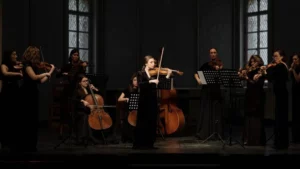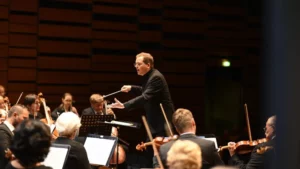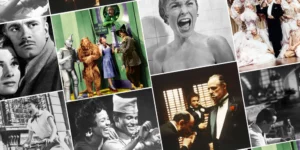Music is an essential part of many video games and can play an important role in the gaming experience. It can help create an immersive atmosphere, reinforce the game’s story and emotions, and improve game memory and recognition.
By using instruments and sounds that are consistent with the game’s world, music can help reinforce feelings of realism and legitimacy. But also to reinforce the emotional impact of these events on the player. Music can also be used as a storytelling tool by emphasizing the emotions and themes of the story and using leitmotifs, or musical themes, that recur throughout the game.
Also, the use of distinctive musical themes for each character or place, the music, can thus help players to better represent these elements in their minds and to better remember them later. This can be especially useful for games that involve a large amount of content or a complex story.
Finally, music can just be enjoyable to listen to and make the game more fun.
Music, an element of the soundscape
Music plays a major role in creating the mood of a video game. It can be used to convey a certain atmosphere or emotion, such as excitement or tension, and help immerse the player in the game world. It can also be used to mark key moments or to help orient the player in its progress.
By using instruments and sounds that are consistent with the game world, music can help create a sense of realism and legitimacy. For example, if the game takes place in a medieval universe, it makes sense to use instruments and musical styles that are characteristic of that era. In this way, music can help enhance the player’s immersion in the game world.
A great example to cite here is the work of the French studio Asobo for the games “A Plague Tale Innocence” and “Requiem”. For these two opuses, composer Olivier Derivière offers us a sublime and frighteningly relevant soundtrack, acclaimed by critics.
We invite you to consult his series of videos, on his YouTube channel, in which he explains the intention and how he created this music to adapt it to the narration and the emotion of the game.
A must-watch for musicians who want to understand more about this unique universe.
As seen together, by synchronizing the music with the image and the events taking place on screen, the music helps to heighten the emotional impact of these events on the player. For example, if the player finds themselves facing a level end boss, the music will generally tend to become more intense and rhythmic to help build that tension as well as the player’s excitement.
Using music strategically can truly enhance the gaming experience for the player.
Music, a way to reinforce immersion
Music can be used to enhance the player’s immersion in the game world by synchronizing the music with the actions, and events, taking place on screen.
Here are some examples in known video game licenses:
- In the adventure game The Last of Us Part II, music is used strategically to heighten the emotional impact of the events unfolding on screen. For example, when the player is faced with a difficult choice or an intense scene, the music becomes increasingly tense and dramatic to help reinforce that emotion in the player.
- In the Final Fantasy XV role-playing game, music is used to reinforce the universe and the identity of the game. Each character has their own music, which recurs throughout the game and helps to strengthen their personality and attachment. from the player to the characters.
- In the action game Uncharted 4: A Thief’s End, music is used to enhance the sense of realism and legitimacy of the game. The music uses instruments and musical styles that are consistent with the different places and cultures that the player find out throughout the game.
- In the simulation game Animal Crossing: New Horizons, music is used to mark key moments in the game and to guide the player in his progress by becoming, for example, more joyful and festive.
- In the role-playing game “The Witcher 3: Wild Hunt”, the music uses traditional instruments from Eastern Europe to enhance the medieval and mythical atmosphere of the game. In addition, the music changes depending on the environment and location. on-screen action, which helps to heighten the emotional impact of events on the player.
For example, when the player finds himself in an intense battle, the music becomes faster and more intense to reinforce the feeling of danger and tension. While we will find lighter themes during our horseback riding in nature.
Music, a storytelling tool
Music plays a crucial role in story telling in video games. Using advanced musical composition techniques, video game composers can create a soundtrack that guides players through this new world and reinforces the emotional connection to the story arc.
We could quote Alexandre Astier (French), actor, musician and composer, during an interview for the launch of the film Kaamelott (part 1): “Music knows what is going to happen before the image, and before the spectator”.
If you pay attention to the music of one of the video games mentioned above, you will notice that it will always tell you what will happen in the next few seconds.
Another example would be the fabulous game Elden Ring. In this open-world RPG, each encounter with a boss, which you encounter randomly in your wanderings, has specific music that plays as soon as he has seen you and focuses you. While you, on your side, you may not even have seen it yet. And all you have is this music that’s going higher and higher, making it clear to you that something is happening around you. As soon as you leave the playing field of this major enemy, the music fades.
The use of leitmotifs is one of the primary methods used to guide players through a video game. A leitmotif is a melody or musical pattern that is associated with a particular character, place, or event in the game.
By using leitmotifs, composers help players remember different elements of the story and strengthen their emotional connection to those elements. For example, in the game The Legend of Zelda: Ocarina of Time, the musical theme of the main character Link is used as a leitmotif to reinforce the perception of his personality and his story.
Formal variation is also a commonly used technique and involves developing a musical theme over the course of the story by changing the melody, harmony, rhythm, or instrumentation. This allows for the creation of musical themes that evolve over the course of the story, reinforcing the connection and emotion of those changes. In Persona 5, formal variation is used to develop the main theme music in a way that reinforces the story and character development.
Finally, time synchronization, the most common and simple practice, consists in synchronizing the music with the actions and events taking place on the screen to reinforce the emotional impact of these events on the player. For example, in the game God of War, the music becomes more intense and rhythmic during battles to enhance players’ excitement and adrenaline.
Nevertheless, in order to really explore this method, it is advisable to create or use sounds, tones, signals…. Very precise and intimately linked to your game/world/universe in order to create a cognitive association between this sound and your game.
If you take this step, then it’s a safe bet that your sounds/music will come out of the simple video game framework and will become sounds known and recognized by your fans.
Music, an element of memorization and recognition
Memorization is a complex process that involves different regions of the brain. Music can help improve memorization by creating emotional and mnemonic links with the information to be memorized.
A 2006 study published in the journal “Neuropsychology” showed that learning a list of words was significantly more effective when the words were presented against a musical background compared to a silent background. The results indicated that music can improve short-term memory by facilitating the segmentation and categorization of information to be memorized.
Another 2011 study published in the journal “Psychology of Music” showed that listening to classical music improves the ability to recall long-term information. The results indicated that listening to classical music increased activation of the brain region responsible for long-term memory, while listening to popular music had no effect on memory.
Studies also show that music can play an important role in memory and recognition in video games.
In 2017, a study published in the journal “International Journal of Human-Computer Studies” showed that gamers completed tasks faster and made fewer errors when musical sounds were linked to gamer actions. While more of them were wrong when the music and actions were in dissonance.
Memorization is an important process in video games, as players need to remember information such as commands, maps, characters, and objects.
Music can help improve memory by using familiar sound patterns to recall information. For example, in an adventure game, the same melody could be used to remind the player that he is in a specific area or that he has to accomplish a particular task.
Recognition is also an important process in video games, as players need to be able to recognize enemies, allies, objects, and scenery items. Music can help improve recognition by using familiar sound patterns to recall information. For example, in a fighting game, specific music could be used to remind the player to be on his guard against a particular enemy.
A well-known example is the sound of equipment boxes in games like: Fortnite, Call of Duty or Tom Clancy’s The Division: this sound quickly tells you the quality of the equipment you are going to find (normal, legendary or epic chest… ). And recognizing that sound can bring you dominance over your opponents.
Here, you have four examples of sounds offered depending on the quality of the equipment found in the chests. A perfect mnemonic so that the player associates the reward received with the need to search and open this chest. While orienting with its distinctive sound effect.
Five famous composers in this field
There are hundreds of thousands of talented composers in this field. But we cannot name them all. We will only offer you five, which are liked by different team members.
Famous composers in the field of video game music (random order):
- Nobuo Uematsu : Japanese composer known for working on the Final Fantasy series of games.
- koji kondo : Japanese composer known for working on the Super Mario Bros. series of games.
- Austin Wintory : American composer known for having worked on the game Journey and for having won a Grammy Award for its soundtrack.
- Jesper Kyd : Danish composer known for working on the Assassin’s Creed series of games and the Borderlands series of games.
- Yoko Shimomura : Japanese composer known for working on the Kingdom Hearts series of games and the Street Fighter series of games.
Five examples of video game soundtracks that have won awards and critical acclaim
Music is an integral part of a video game, and is an art in its own right, which also has these ceremonies and awards. Here are five award-winning and critically acclaimed video game soundtracks (in random order):
- The Last of Us Part II (2020): Original soundtrack composed by Gustavo Santaolalla, which won a Grammy Award and was nominated for numerous other awards.
- Red Dead Redemption 2 (2018): Original soundtrack composed by Woody Jackson and directed by Daniel Lanois, which was nominated for numerous awards.
- Celestial (2018): Original soundtrack composed by Lena Raine, which was nominated for numerous awards and won Best Game Soundtrack at The Game Awards 2018.
- Journey (2012): Original soundtrack composed by Austin Wintory, which won a Grammy Award and was nominated for numerous other awards.
- Final Fantasy VII (1997): Original soundtrack composed by Nobuo Uematsu, which received much critical acclaim and became one of the most famous game soundtracks of all time.
What future for music in video games?
The future of music in video games is very bright, with new technologies enabling even deeper integration of music into games. Video game developers are increasingly aware of the importance of music in enhancing the gaming experience and are developing methods to integrate music into games even more seamlessly.
One of the most important developments in this area is Dynamic Music System (DMS) technology. This is a technique that allows video game composers to create music tracks that can be adapted in real time based on in-game action. This helps create a more immersive sound experience for gamers. and heighten emotions. For example, a 2017 study published in the journal “Frontiers in Psychology” showed that gamers reported a more immersive gaming experience when music adapted in real time to in-game action.
The evolution of virtual reality (VR) and augmented reality (AR) technologies also offers opportunities for video game developers to use music in even more immersive ways. Users can be immersed in sound universes and live new musical experiences.
Hoping that you have learned things, discovered others and enjoyed this read.
Thank you for your attention.











